|
|
|
Sort Order |
|
|
|
Items / Page
|
|
|
|
|
|
|
| Srl | Item |
| 1 |
ID:
131024
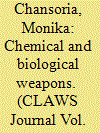

|
|
|
|
|
| Publication |
2014.
|
| Summary/Abstract |
In a March 2014 report, the United Nations human rights investigators con?rmed that chemical weapons were indeed used in Syria in 2013, which apparently came from the stockpiles of the Syrian military, whose chemical weapons stash reportedly included mustard gas. The report con?rmed that the deadly nerve agent Sarin was used in three separate incidents: the Damascus suburb ofal-Ghouta in August 2013, Khan al-Assal in March 2013 and Saraqeb near the northern town of ldlih in April 2013. While the Bashar al-Assad government and the Syrian opposition indict each other of using chemical weapons, which are strictly banned as per existing international law and convention, the incidents amount to being the deadliest chemical attacks the world has witnessed in almost a quarter of a century.
|
|
|
|
|
|
|
|
|
|
|
|
|
|
|
|
| 2 |
ID:
133690
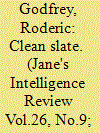

|
|
|
|
|
| Publication |
2014.
|
| Summary/Abstract |
As Syria's declared chemical weapons are destroyed, Roderic Godfrey assesses whether their destruction has stopped the Syrian regime from contravening its new international obligations, and the dilemma faces by the international community.
|
|
|
|
|
|
|
|
|
|
|
|
|
|
|
|
| 3 |
ID:
132889
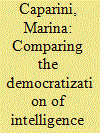

|
|
|
|
|
| Publication |
2014.
|
| Summary/Abstract |
This article discusses the reform of intelligence governance in two sub-regional groupings of former communist states: East Central Europe and the Balkans. These two sub-regions are delineated according to the pace and nature of transformations that they have undergone since the collapse of communist rule and their relations with respect to the European Union, the key political and economic organization in Europe. A number of lessons are drawn from comparing experiences in the two sub-regions relating to democratic reform of the security apparatus, and in particular the intelligence sector. Significant factors in the consolidation of democratic governance of intelligence include the nature of precursor communist-era regimes and the legacies they created, whether armed conflict has occurred during the transition, the extent and character of external (especially EU) assistance, and the strength of media and civil society. These factors appear to have influenced how transitional regimes have sought to introduce institutional reforms to constrain the powers of those services and their susceptibility to arbitrary use. They also have influenced measures taken to redress abuses by intelligence services under the preceding communist regime and the legitimation of the post-authoritarian state.
|
|
|
|
|
|
|
|
|
|
|
|
|
|
|
|
| 4 |
ID:
133793
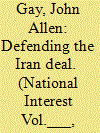

|
|
|
|
|
| Publication |
2014.
|
| Summary/Abstract |
Nuclear talks have yielded a framework that buys time for negotiation and reduces the risk of miscalculation on either side.
IT WAS LONG PAST MIDNIGHT IN GENEVA last November when the rumors began to fly. Iran and the world powers had just reached a deal on its nuclear program. An international crisis that had been building toward what seemed like war for more than a decade was now on the path to resolution. The deal, a haggard John Kerry confirmed, was real. It wasn't comprehensive-Iran would still be heavily sanctioned and heavily centrifuged-but it was unprecedented. All prior efforts had fallen apart.
|
|
|
|
|
|
|
|
|
|
|
|
|
|
|
|
| 5 |
ID:
184708
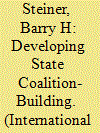

|
|
|
|
|
| Summary/Abstract |
This article pits two diplomatic strategies in competition for policy officials’ support. Distributive strategies promote one party’s goals at the expense of another. Integrative strategies promote goals that are in conflict with those of another state. The focus is strategy choice and strategy’s bargaining potential of less developed countries (LDC) coalitions in the GATT/WTO regime. Amrita Narlikar, whose study of LDC coalitions is relied upon here, finds that many LDC states employ distributive strategy because of asymmetric structure, which emphasizes the gap between LDC and developed state capabilities, yet she critiques that strategy as ineffective in supporting LDC objectives. This disconnect is probed in this article, which concludes that LDC distributive strategy must be improved and that the integrative strategy’s success in attaining LDC objectives can be important enough to override the structural argument for distributive strategy.
|
|
|
|
|
|
|
|
|
|
|
|
|
|
|
|
| 6 |
ID:
128444
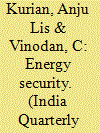

|
|
|
|
|
| Publication |
2013.
|
| Summary/Abstract |
Energy security is considered to be a universal issue in the twenty-first century. It denotes the right to use reliable sources of energy at competitive prices produced in an environmentally sustainable and safe means as well as the security of supply and demand. The strategic significance of energy security has been stirred by the political and economic events since 1970. The purpose of energy security is to guarantee adequate, reliable supplies of energy at reasonable prices in ways that do not endanger major national values and objectives. Energy security has different dimensions that vary from economic, environmental, social, foreign and technological progress which differ from country to country, and also from one period to another. To meet the growing aspirations of the people and the economies of South Asia, countries are under massive social and political strain to secure reliable, sustainable and reasonably priced energy supplies to meet the escalating demand for commercial energy. Energy security is thus no longer merely a catchword but an irrefutable reality for vital economic development throughout South Asia. And energy security will remain a high priority issue all over the world and the duty of ensuring energy security to the people and the state is not only confined to national governments but also to regional and international regime. This article analyses the emerging trends of energy security through the most debated contemporary issues such as climate change, sustainable development and globalisation.
|
|
|
|
|
|
|
|
|
|
|
|
|
|
|
|
| 7 |
ID:
134081
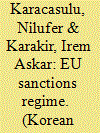

|
|
|
|
|
| Publication |
2014.
|
| Summary/Abstract |
Although there is enormous discussion on normative power Europe, there is relatively less focus on the EU sanctions regime, though sanctions have become a useful foreign policy tool as the EU has applied sanctions within the framework of the Common Foreign and Security Policy. Looking at the literature, Kreutz focused on the EU sanctions regime in the time period of 1981-2004, during which sanctions
were used to accomplish normative goals. Yet, later on Brummer argued that although norms and values still play a role in the EU's sanctions regime, more often they were surpassed by security and economic interests. This article examines the previous work on the EU sanctions regime and tries to comprehend why the use of sanctions has increased over time as well as whether they have been "selectively" used. In addition, the article analyzes whether the normative commitment is crucial in the construction of the EU sanctions regime. The EU sanctions regime toward Iran is analyzed in particular, because as indicated by Santini and Tabrizi, Iran is the first country against which the EU has developed a new strategy out of weapons of mass destruction concerns, starting in 2006. Since 2010, EU foreign ministers have adopted tougher sanctions in an effort to block its controversial nuclear program. Recently, the Iran nuclear deal of November 2013 was interpreted as attributable to sanctions against Iran, in which EU sanctions have constituted a remarkable role, have proven effective.
|
|
|
|
|
|
|
|
|
|
|
|
|
|
|
|
| 8 |
ID:
100328
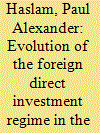

|
|
|
|
|
| Publication |
2010.
|
| Summary/Abstract |
The purpose of this article is to describe the international regime governing foreign direct investment in the Americas and assess its implications for regional economic governance. The article develops a novel methodology to map the multi-layered patchwork of investment agreements according to the level of investment protection offered by each agreement. The mapping exercise demonstrates the existence of two distinct legalization projects in the Americas, one which broadly corresponds to the investment protection concerns of the United States, and a second, overlapping regime, which better reflects the interest of many Latin American governments in maintaining their policy autonomy. The article argues that these distinct visions are anchored in a common dispute settlement system based on binding international arbitration, which tends to harmonize the governance effects of the regime.
|
|
|
|
|
|
|
|
|
|
|
|
|
|
|
|
| 9 |
ID:
067822
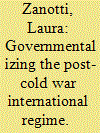

|
|
|
| 10 |
ID:
134085
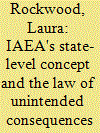

|
|
|
|
|
| Publication |
2014.
|
| Summary/Abstract |
In September 2013, the International Atomic Energy Agency (IAEA) Board of Governors reviewed a report by Director-General Yukiya Amano on efforts to further strengthen the effectiveness of safeguards and increase their efficiency.[1] The report described an approach to the implementation of safeguards that had come to be known as the "state-level concept."
|
|
|
|
|
|
|
|
|
|
|
|
|
|
|
|
| 11 |
ID:
128119
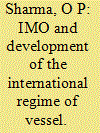

|
|
|
|
|
| Publication |
2013.
|
| Summary/Abstract |
It is evident that the famous English poet, Samuel Taylor Coleridge had a premonition about the fate of the ocean in the closing years of the twentieth century. Marine pollution is very much a product of modern technology. Recognizing marine pollution as a problem of global dimension is of relatively recent origin
|
|
|
|
|
|
|
|
|
|
|
|
|
|
|
|
| 12 |
ID:
131498
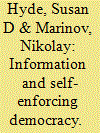

|
|
|
|
|
| Publication |
2014.
|
| Summary/Abstract |
This article argues that when democracy is not yet institutionalized, leaders have little incentive to push for clean elections, in part because they are likely to face accusations of fraud from domestic opposition groups regardless of their true behavior. Reputable international election observers can facilitate self-enforcing democracy by providing credible information about the quality of elections, thus increasing citizens' ability to coordinate against the regime when election fraud occurs, and discrediting "sore loser" protests. Patterns of postelection protests are consistent with the argument, including that postelection protests are more likely and last longer following negative reports from international observers. International election observers help promote democracy by making postelection protest more accurate in the short term, thereby increasing incentives for leaders to hold democratic elections in the long term.
|
|
|
|
|
|
|
|
|
|
|
|
|
|
|
|
| 13 |
ID:
137240
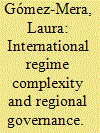

|
|
|
|
|
| Summary/Abstract |
In recent years, the Americas have witnessed an unprecedented surge in the number and scope of regional integration agreements, resulting in a complex “spaghetti bowl” of trade and economic relations. What are the consequences of this proliferation of overlapping and parallel institutional commitments among countries in the region? How has this increasing regime complexity affected the dynamics of cooperation among Latin American countries? And what does the case of overlapping regional agreements in the Americas tell us about the effects of regime complexity on regional governance? Drawing on the literature on international regime complexity, I identify three mechanisms through which the proliferation of regional agreements have undermined the effectiveness of cooperation in the Americas: by introducing legal fragmentation and rule ambiguity; by facilitating cross-institutional political strategies that allow countries to behave in opportunistic ways; and through competition and other feedback effects that work to erode regional unity. The article has implications for two broader literatures in international relations: work on international regime complexity and scholarship on regionalism and regional trade agreements.
|
|
|
|
|
|
|
|
|
|
|
|
|
|
|
|
| 14 |
ID:
158460
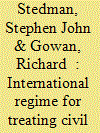

|
|
|
|
|
| Summary/Abstract |
The post–Cold War international order has promoted a “standard treatment” for civil wars involving the use of mediation to end conflicts and the deployment of peacekeeping forces to implement the resulting settlements. The United Nations has played a leading role in applying this standard treatment, which enjoys broad international support. By contrast, Western efforts to promote more robust humanitarian intervention as a standard response to civil wars remains controversial. While effective in relatively permissive postconflict environments, international mediation and peacekeeping efforts have proved insufficient to resolve harder cases of civil war, such as those in South Sudan and Syria. The UN has struggled to make the standard treatment work where governments refuse to cooperate or low-level violence is endemic. Growing major-power tensions could now undermine the post–Cold War regime for the treatment of civil wars, which, for all its faults, has made a significant contribution to international order.
|
|
|
|
|
|
|
|
|
|
|
|
|
|
|
|
| 15 |
ID:
129109
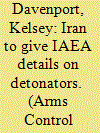

|
|
|
|
|
| Publication |
2014.
|
| Summary/Abstract |
Iran will provide the International Atomic Energy Agency (IAEA) with information about its past development of a detonator that could be used to as a trigger in nuclear weapons, according to an agreement reached by the two sides last month. In a Feb. 9 joint statement, Iran and the IAEA described the two days of talks in Tehran as "constructive" and announced seven actions for Iran to take by May 15 to further the agency's investigations into its unresolved concerns about Iran's current nuclear program and past actions. One of the actions requires Tehran to provide the IAEA with information on exploding bridge wire detonators, which can be used to trigger nuclear weapons. They can also be used in civilian applications, including drilling for oil and gas, and for conventional military explosives.
|
|
|
|
|
|
|
|
|
|
|
|
|
|
|
|
| 16 |
ID:
129119
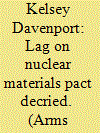

|
|
|
|
|
| Publication |
2014.
|
| Summary/Abstract |
The failure of several key states to ratify a nuclear security treaty ahead of this month's nuclear security summit is a disappointment, but an Indonesian initiative may increase the pace of ratifications, an official familiar with the preparations for the meeting said. The two previous nuclear security summits, in Washington in 2010 and Seoul in 2012, have emphasized the importance of the entry into force of a 2005 amendment to the Convention on the Physical Protection of Nuclear Material (CPPNM). The March 24-25 summit in The Hague is also likely to encourage ratification of this treaty. The original treaty, which entered into force in 1987, sets security standards for nuclear material in transit. Its 2005 amendment would expand the scope of the physical protection measures to cover material in storage. An additional 26 ratifications are necessary to reach the 98 necessary for bringing the amendment into force. Although the 2012 Seoul summit communiqué urged states "in a position to do so to accelerate their domestic approval" of the amendment in order to achieve entry into force by 2014, 17 of the 53 summit participants have yet to ratify it
|
|
|
|
|
|
|
|
|
|
|
|
|
|
|
|
| 17 |
ID:
129126
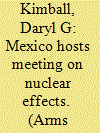

|
|
|
|
|
| Publication |
2014.
|
| Summary/Abstract |
For the second time in two years, diplomats and civil society representatives gathered last month for a two-day conference on the medical and societal impacts of nuclear weapons use, with many governments calling for "new international standards and norms, through a legally binding instrument," according to the chair's summary of the meeting. The agenda of the Feb. 13-14 conference in Nayarit, Mexico, included several presentations from survivors of the Hiroshima and Nagasaki bombings and from experts on the effects of and responses to single nuclear detonations and large-scale nuclear attacks. "It is a fact that no State or international organization has the capacity to address or provide the short- and long-term humanitarian assistance and protection needed in case of a nuclear weapon explosion," concluded Juan Gómez Robledo, conference chair and undersecretary for multilateral affairs and human rights in the Mexican Foreign Ministry. The Nayarit gathering brought together 146 government representatives-more than the 127 that met in Oslo, Norway, in March 2013 for the first such conference.
|
|
|
|
|
|
|
|
|
|
|
|
|
|
|
|
| 18 |
ID:
131810
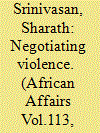

|
|
|
|
|
| Publication |
2014.
|
| Summary/Abstract |
A decade ago international peacemakers turned a blind eye when violence in Darfur, Sudan, first escalated into civil war. This article addresses the war's brutal beginnings, using a close reading of internal communications, interviews, and public statements to deepen our understanding of the predicament that key peacemakers found themselves in, and dug themselves into. For a long first year, when the majority of violent deaths in Darfur occurred, peacemakers employed a set of discursive strategies that intentionally depoliticized Darfur's conflict. Despite knowledge to the contrary, peacemakers carefully avoided connections between Darfur and the ongoing north-south peace negotiations they were championing to end Sudan's long second civil war. These ideational moves gave peacemakers a degree of cover for not responding directly to the conflict, but they also shaped the political calculations and opportunities of domestic actors in ways that further enabled armed violence, ultimately leading to policy failure. The problems of peacemaking in Sudan highlight the particular challenges that arise from negotiating peace. Negotiations give words a privileged place in taming the materiality of violence, yet this also leaves peacemakers liable to shaping new trajectories of political violence born out of local dissatisfaction with the prospects for peace.
|
|
|
|
|
|
|
|
|
|
|
|
|
|
|
|
| 19 |
ID:
130845
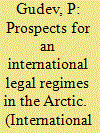

|
|
|
|
|
| Publication |
2014.
|
| Summary/Abstract |
The article examines the application of international law, particularly the 1982 Law of the Sea Convention, to Arctic regions and international relations between countries who have territory in the Arctic regions. The growth of bilateral and multilateral agreements for environmental protection of the Arctic Ocean and its marine biodiversity is examined. The impact of those agreements on the concept of freedom of the seasons is discussed.
|
|
|
|
|
|
|
|
|
|
|
|
|
|
|
|
| 20 |
ID:
131599
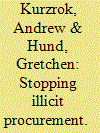

|
|
|
|
|
| Publication |
2014.
|
| Summary/Abstract |
A Hollywood, Florida, conference of specialists in preventing, detecting, and responding to money laundering might not seem to be the most likely spot for the next innovation in nuclear nonproliferation policymaking. Yet, a March speech by Jennifer Shasky Calvery, director of the Department of the Treasury's Financial Crimes Enforcement Network (FinCEN), suggested an approach that regulators charged with stopping the proliferation of nuclear weapons would do well to study. Shasky Calvery stated that "FinCEN needs to find ways for more dynamic, real-time information sharing, both by and between financial institutions, and with FinCEN and law enforcement."[1] The information to which she was referring is transaction data related to money laundering that currently reside within banks, casinos, credit card processing companies, and many other types of financial businesses. Export control regulators could apply Shasky Calvery's approach to their own mission. In the nonproliferation context, FinCEN's anti-money laundering data would be analogous to the inquiries that potential buyers of dual-use commodities place over the phone or on commercial websites. Dual-use commodities have legitimate civilian applications, but can also be used to support nuclear weapons development. If a request appears suspicious, most firms will decline the request. Unlike their counterparts in the financial sector, however, export control regulators and private business have few tools with which to gather and disseminate this critical information about the networks illicitly seeking strategic commodities. Taking a page from the anti-money laundering playbook may help stop proliferation procurement.
|
|
|
|
|
|
|
|
|
|
|
|
|
|
|
|
|
|
|
|
|